
Gastroenterology
Scope & Guideline
Advancing Digestive Health Through Premier Research
Introduction
Aims and Scopes
- Clinical Research on Gastrointestinal Disorders:
The journal publishes original research articles that explore various gastrointestinal disorders, including their pathophysiology, diagnosis, and treatment, emphasizing evidence-based clinical practices. - Innovations in Endoscopy and Surgical Techniques:
It covers advancements in endoscopic procedures and surgical techniques, providing insights into their efficacy and safety in treating gastrointestinal conditions. - Microbiome Studies:
The impact of gut microbiota on gastrointestinal health and disease is a significant focus area, highlighting the relationship between microbiota composition and various digestive disorders. - Pharmacology and Therapeutics:
Research related to pharmacological treatments for gastrointestinal diseases, including novel drug therapies, biologics, and their mechanisms of action, is a core component of the journal. - Epidemiological and Health Services Research:
The journal includes studies that assess the epidemiology of gastrointestinal diseases and health service delivery, aiming to improve patient outcomes and healthcare practices. - Patient Education and Health Disparities:
It addresses the importance of patient education in managing gastrointestinal diseases and highlights disparities in healthcare access and outcomes among different populations.
Trending and Emerging
- Artificial Intelligence in Gastroenterology:
The integration of artificial intelligence in diagnostics and treatment planning is gaining traction, with studies exploring its utility in enhancing diagnostic accuracy and patient outcomes. - Personalized Medicine Approaches:
Research focusing on personalized medicine, including genetic profiling and tailored therapies for gastrointestinal diseases, is increasingly prominent, reflecting a shift towards individualized patient care. - Microbiome and Gut Health:
There is a growing emphasis on understanding the role of the microbiome in gastrointestinal health, with studies linking microbiota composition to disease outcomes and treatment responses. - Telemedicine and Remote Care:
The COVID-19 pandemic has accelerated the adoption of telemedicine in gastroenterology, with research exploring its effectiveness in managing chronic conditions and improving access to care. - Health Disparities in Gastroenterology:
Studies addressing health disparities and their impact on gastrointestinal disease management are emerging, highlighting the need for equitable healthcare solutions. - Novel Therapeutic Agents and Biologics:
The exploration of new therapeutic agents, particularly biologics for inflammatory bowel diseases and other gastrointestinal disorders, remains a key focus area, reflecting ongoing advancements in treatment options.
Declining or Waning
- Traditional Surgical Techniques:
There has been a noticeable decrease in publications focused on traditional surgical techniques as minimally invasive and endoscopic approaches gain preference in clinical practice. - Basic Science Research Without Clinical Application:
Research that does not bridge basic science to clinical application has seen reduced attention, as the journal emphasizes studies that have direct implications for patient care. - General Gastroenterology Topics:
Specific topics in general gastroenterology that do not focus on emerging issues or innovative treatments are being overshadowed by more targeted and specialized research. - Epidemiological Studies with Limited Regional Focus:
While epidemiological studies are still relevant, those that lack a global or diverse regional perspective are less frequently published, reflecting a shift towards more comprehensive analyses. - Historical Analysis of Gastrointestinal Diseases:
Research that primarily focuses on historical data without contributing new insights or advancements in understanding current gastrointestinal diseases is becoming less favored.
Similar Journals
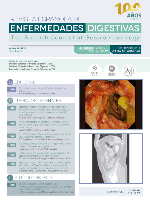
REVISTA ESPANOLA DE ENFERMEDADES DIGESTIVAS
Elevating clinical practices through open access knowledge.REVISTA ESPANOLA DE ENFERMEDADES DIGESTIVAS, a pivotal Open Access journal published by ARAN EDICIONES, S A, has been at the forefront of advancing the field of gastroenterology since its inception in 1990. With a robust commitment to disseminating high-quality research, the journal provides a platform for researchers, clinicians, and students to share innovative findings and insights concerning digestive diseases. The journal is characterized by its Q3 ranking in both Gastroenterology and Miscellaneous Medicine categories, indicative of its significant contributions to these fields, and is positioned within the 36th percentile of Scopus rankings for medicine related to gastroenterology. Based in Spain, REVISTA ESPANOLA DE ENFERMEDADES DIGESTIVAS has embraced the Open Access model since 2004, ensuring that its articles are readily available to a global audience without financial barriers. The journal not only supports academic discourse but also plays a crucial role in improving clinical practices and health outcomes related to digestive health.

Gastrointestinal Disorders
Connecting Researchers to Revolutionize Gastrointestinal CareGastrointestinal Disorders is a prominent open-access journal published by MDPI, based in Switzerland, that focuses on the latest research and innovations in the fields of gastroenterology, hepatology, and immunology. Since its inception in 2019, the journal has provided a vital platform for researchers and professionals to disseminate their findings, engaging with a global audience keen on advancing knowledge in gastrointestinal health. With a dedicated commitment to high-quality, peer-reviewed articles, Gastrointestinal Disorders has gained recognition in 2023, achieving Q3 status in gastroenterology and notable rankings in several other categories, including a respectable position in the quartiles for hepatology, immunology, and oncology. Despite its recent establishment, the journal has quickly become a valuable resource, facilitating open access to critical insights in the study of gastrointestinal diseases and their management, ensuring that emerging research is readily available to inform clinical practice and educate future professionals.
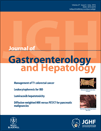
JOURNAL OF GASTROENTEROLOGY AND HEPATOLOGY
Elevating standards in gastrointestinal and liver disease research.Welcome to the JOURNAL OF GASTROENTEROLOGY AND HEPATOLOGY, an esteemed publication in the field of gastroenterology and hepatology, proudly published by WILEY. Established in 1986, this journal serves as a crucial platform for researchers, healthcare professionals, and students, presenting groundbreaking research and comprehensive reviews that drive advances in understanding and treating gastrointestinal and liver diseases. With a strong reputation evidenced by its Q1 ranking in gastroenterology and Q2 ranking in hepatology, this journal ranks impressively in the Scopus metrics - positioned at #22 out of 167 in gastroenterology and #21 out of 82 in hepatology, reflecting its contribution to scholarly excellence. Although it does not offer open access options, the journal’s rich archive and diverse topics make it indispensable for those dedicated to improving patient outcomes in these critical areas of medicine. Whether you are a seasoned researcher or an aspiring medical professional, engaging with this journal will keep you at the forefront of the latest developments and emerging trends in gastroenterology and hepatology research.
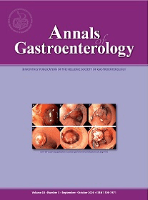
Annals of Gastroenterology
Pioneering Research in Gastroenterology and BeyondAnnals of Gastroenterology, published by the Hellenic Society of Gastroenterology, serves as a pivotal platform for advancing the field of gastroenterology, highlighting research that spans across the spectrum of gastrointestinal diseases and treatments. With an ISSN of 1108-7471 and E-ISSN of 1792-7463, this journal has established itself as a reputable source of scholarship since its inception in 2000, converging valuable insights through to 2024. Ranking within Q2 of its category and achieving a respectable 78th position out of 167 in the Scopus rankings, the journal holds a strong presence in the academic community, appealing to researchers, clinicians, and students alike. Although not an open access publication, Annals of Gastroenterology is dedicated to disseminating high-quality research that aids in the understanding and treatment of gastrointestinal conditions, making it an essential reference point for those engaged in this dynamic field.

Clinical Gastroenterology and Hepatology
Connecting Researchers and Clinicians for Better Health OutcomesClinical Gastroenterology and Hepatology, published by Elsevier Science Inc, stands as a leading journal in the fields of gastroenterology and hepatology. With an ISSN of 1542-3565 and an E-ISSN of 1542-7714, this esteemed publication has earned its place in the top quartile (Q1) of both gastroenterology and hepatology categories as of 2023, ranking 6th out of 167 and 7th out of 82 respectively. The journal aims to disseminate innovative research, clinical studies, and case reports that advance the understanding and treatment of gastrointestinal and liver diseases. Targeted towards researchers, healthcare professionals, and students, it provides crucial insights into emerging therapies and medical advancements. Clinical Gastroenterology and Hepatology is not only a pivotal resource for contemporary gastroenterological research but also fosters collaboration and knowledge-sharing within the medical community. With a converging publication history from 2003 to the present, the journal continues to build on its solid foundation of scientific excellence and relevance.
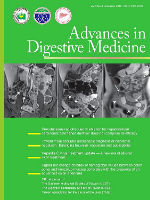
Advances in Digestive Medicine
Advancing Knowledge for Better Digestive CareAdvances in Digestive Medicine is a premier scholarly journal dedicated to the evolving field of gastrointestinal health and diseases. Published by WILEY, this journal aims to disseminate high-quality research encompassing a wide range of topics related to digestive medicine, from foundational studies to innovative clinical applications. As a significant resource for researchers, professionals, and students alike, Advances in Digestive Medicine fosters a deeper understanding of digestive disorders, promoting collaboration and knowledge exchange within the scientific community. Although it offers subscription-based access, the journal ensures comprehensive coverage of groundbreaking studies that significantly impact clinical practice and patient care in the field. With an ISSN of 2351-9797 and an E-ISSN of 2351-9800, it stands as an essential platform for anyone involved in digestive health research.

Frontline Gastroenterology
Innovating Insights in Gastrointestinal HealthFrontline Gastroenterology is a leading academic journal published by the BMJ Publishing Group that plays a vital role in advancing the field of gastroenterology and hepatology. Established in 2013, this prestigious journal has established itself as a significant resource for researchers, healthcare professionals, and students alike, maintaining a commendable impact factor and consistently achieving a Q2 ranking in both gastroenterology and hepatology categories as of 2023. With its focus on disseminating high-quality, peer-reviewed research, Frontline Gastroenterology covers a wide scope of topics pertinent to the understanding, diagnosis, and treatment of gastrointestinal and liver diseases. Although it does not offer Open Access options, its content is accessible through various institutional and personal subscriptions, ensuring that critical findings reach an international audience. As the journal continues to converge into the future, it remains dedicated to fostering innovation and dialogue in gastroenterological sciences.
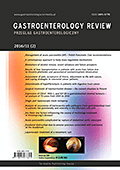
Gastroenterology Review-Przeglad Gastroenterologiczny
Transforming Gastroenterology Through Open Access ResearchGastroenterology Review-Przeglad Gastroenterologiczny is a premier, peer-reviewed journal published by TERMEDIA PUBLISHING HOUSE LTD, focusing on the dynamic field of gastroenterology. Since its inception in 2006, it has embraced an Open Access model, ensuring that the latest research is readily accessible to a global audience, fostering collaboration and innovation. Based in Poland, this journal serves as a crucial platform for disseminating significant findings in gastrointestinal research, with a current Scopus rank placing it at the 39th percentile in its category. With a commitment to advancing the understanding of gastroenterological conditions, *Gastroenterology Review* publishes original articles, reviews, and case studies that contribute to both clinical practice and academic research. The journal is particularly aimed at researchers, healthcare professionals, and students who ignite dialogues that shape the future of gastrointestinal health. Explore the comprehensive insights that this journal offers, as it encapsulates vital developments from 2008 to 2024 in the ever-evolving landscape of gastroenterology.

DIGESTION
Championing scholarly contributions in gastroenterology since 1896.DIGESTION is a prestigious journal dedicated to advancing the field of gastroenterology, published by KARGER, a renowned publisher based in Switzerland. With a rich history dating back to 1896, this journal has continuously evolved and serves as a vital platform for researchers, professionals, and students alike. DIGESTION is recognized for its scholarly contributions, holding an impressive rank of 23 out of 167 in the Scopus database, placing it within the top 14% of gastroenterology journals, as evidenced by its Q2 classification. The journal's commitment to high-quality research is reflected in its wide-ranging scope, addressing various aspects of digestive health, clinical practices, and innovative therapies. Though not an open-access journal, it provides comprehensive access options that ensure the dissemination of crucial research findings to the global community. As we move towards 2024, DIGESTION continues to facilitate dialogue and insights in gastroenterological research, making it an indispensable resource for those in the field.

WORLD JOURNAL OF GASTROENTEROLOGY
Advancing the frontiers of digestive health.WORLD JOURNAL OF GASTROENTEROLOGY, published by BAISHIDENG PUBLISHING GROUP INC, stands at the forefront of gastrointestinal research, providing a critical platform for the dissemination of high-quality studies in the field. With an impressive impact factor reflected in its Q1 rankings in both Gastroenterology and Miscellaneous Medicine, this journal is recognized for its rigorous peer-review process and commitment to advancing knowledge and practices related to digestive health. Covering comprehensive scopes from clinical advancements to innovative therapies, the journal serves an essential role for researchers, clinicians, and students, enabling them to stay updated on the latest developments and findings from 1998 through 2024. The open access model facilitates broader accessibility, ensuring that groundbreaking research reaches a global audience. The journal's ranking within the top 15% of Scopus demonstrates its significant contribution to the academic community, making it a valuable resource for advancing the science of gastroenterology.